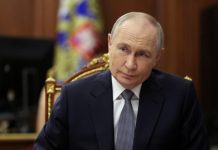By Sergiu Mișcoiu, for EUvsDisinfo
In order to explore the degree of absorption of anti-Western propaganda among young people in sub-Saharan Africa, we carried out a field survey consisting of qualitative research using semi-structured interviews with 85 young people (from 18 to 30 years old), representing the Economic Community of West African States (ECOWAS) member states, Chad and Mauritania, 17 countries in total. The survey was carried out in June and September 2023. A diverse sample was essential (men and women, Muslims, Christians and Animists, representatives of the large ethnic groups, etc.).
What can we draw from this survey?
First, almost all of those interviewed said they are deeply unhappy with their social and economic situation, and that the blame for this was shared by their leaders and, as one unemployed Guinean man expressed, “the former colonial powers who continue to subjugate us”.
Next, that the “hopeless situation” (Senegalese student) of young Africans would legitimize “any action, any activity which enables us to survive” (Malian baker). For some, joining the “maquis” (a euphemism used to denote politico-military Islamist movements) could ultimately be “a solution to escaping the famine that is becoming increasingly unbearable, particularly in the rural Sahel region” (Chadian doctor). However, for the majority, the current course of events, particularly the “forced departure of France from several countries” (Togolese student), gives cause for hope.
It is precisely this hope that has become the breeding ground for Kremlin propaganda for over a decade. Because for a large portion of the subjects interviewed, they have experienced an “awakening” ever since they began visiting the sites and subscribing to the social networks where “they speak the truth”. Of course it’s “uncomfortable for the French, the Americans and their friends, but it’s the Truth” (Ivorian restaurant owner). Being less and less likely to follow official media channels, the young people interviewed get their information almost exclusively from Facebook groups, TikTok, Telegram, etc., and subscribe to social media feeds whose anti-European and anti-American propaganda is their primary reason for existing. With a nod to illustrious “anti-colonial resistance figures such as Ahmed Sékou-Touré and Kwame Nkrumah” (Beninese teacher), Kremlin propagandists seek to show that the current turn taken by “countries that have chosen to truly free themselves from colonial rule, such as Niger, Burkina Faso and Mali” (Cape-Verdean student) is a continuation of history from the 1960-1970s, when a number of regimes in sub-Saharan Africa turned towards Moscow. Joining digital networks connected by pro-Russia influencers has become “a normal thing to do” (Bissau-Guinean farmer), because even if “the Russians are, in turn, spreading propaganda, it’s for our benefit, it gives us hope” (Nigerian sales assistant). One of the qualities of this propaganda, which cannot go unrecognized for what it is, is that it “is fair, that it benefits the people of Africa” (unemployed Burkinabe man).
Nourished by radical information and opinions, the parallel truth, which operates through Manichaeism and the permanent creation of scapegoats, has for our interviewees become an important enough reason to act and position themselves “against the old and new empires” (Gambian teacher) and “not necessarily for the Russians or the Chinese” (Liberian mechanic). But, coincidentally, “in the majority of cases, it comes down to the same thing” (Ghanaian journalist).
Societies exposed to fierce and effective propaganda fueled by existing grievances
First of all, it should be noted that several surveys have demonstrated that multiple factors are converging and affecting the capacity of Western institutions to persuade African governments of their good intentions.[1]
Among these factors, we must first consider the deeply ideologically rooted anti-neocolonialism that has just been reconfirmed by public reactions in response to the wave of coups d’état perpetrated between 2020 and 2023 in Guinea, Mali, Burkina Faso, Gabon and Niger. As these countries were perceived as being led by leaders supported by Western countries, specifically by France, these coups enjoyed widespread popular support in many other countries in sub-Saharan Africa. While the provisional or transitional governments appointed by the juntas that took power may have been constitutionally illegitimate, they enjoyed a much higher degree of implicit or explicit support than those of the previous overthrown regimes.[2]
In addition to this, the arrival of social networks, which have become a principle source of information, has only accelerated the phenomenon.
Strongly invested in systematic disinformation, Putin’s Russia has committed significant financial and human resources to the ongoing propagation of anti-Western feeling, especially in Sahelian countries and in central Africa. Moscow employs a vast and diverse set of tools, ranging from more traditional means (such as communications bombardments through ambassadors, consulates, chambers of commerce and Russian companies established in Africa) to more disruptive strategies such as, for example, the creation of thousands of fake accounts that saturate truncated information networks on social media. Hyper-specialized in these activities, the Kremlin’s influencers work on the basis of a meticulous distribution of tasks, according to targeted countries/regions/communities, using a differentiation of profiles varying between the most relentless to less incisive, adapted in relation to their targeted audience (young people, women, Muslims/Christians, students, etc.). This approach enables them to simulate a feeling of closeness with the target groups or individual users, and to create a climate of trust by feeding the illusion of a common shared cause.
In the face of anti-Western propaganda that constantly points the finger at neo-colonialism and imperialism being the primary and ultimate reason for all of Africa’s misfortunes, the governments of the countries in the region often choose the comfortable route of silence or compliance, and implicit or even sometimes explicit acquiescence, trying to ride the wave of public outrage.[3]
Do young Africans really listen to anti-Western discourse?
Young Africans appear to have largely assimilated elements of anti-Western propaganda and are increasingly convinced that the difficult, indeed even desperate situation faced by their countries is, above all, due to the presence and actions of countries from “the North” and specifically the former colonial powers, including France. This at least in part explains their behavior, which consists of endorsing national leaders with anti-European and anti-American discourse showing sympathy for the rival powers of the West.
This survey nevertheless shows that this anti-Western feeling is not systematically accompanied by an identification with Russian, Chinese or other ideologies and geopolitical aspirations. In fact, young Africans instead subscribe to anti-Western propaganda in a mechanical way: they say they only “prefer the Russians to the French” because they think the latter are responsible for the stagnation of African societies. There is not positive support for Russia’s cause as such, but rather the imaginary projection of an alliance based on the old adage that “the enemy of my enemy is my friend”. That said, some of the young Africans interviewed implicitly or explicitly admit that Russia’s interests are “at the very least as imperialistic as those of the French and the Americans” (K.D. sales assistant, Cape Verde).
This type of research is not only useful for understanding the mechanisms of Russian propaganda in Africa, but above all for documenting the behavioral changes that underline the need for direct and far-reaching action to counter the current trend. This action must cover at least two essential aspects: first, the effective and efficient presence of international institutions on the ground must be stepped up, specifically by increasing financial and logistical support for the implementation of targeted projects aimed at the local and regional development of African countries, and above all by stimulating the economic activities that create jobs. Second, the way in which links are created between civil society and both the formal and informal action groups that abound among young Africans and exert significant influence on how their ideas and opinions are formed should be extensively reviewed and strengthened. Substantial effort must be made to reverse the current trend so that young Africans are directly and widely empowered to become spokespeople for the democratic and liberal values shared and supported by the European Union and international democratic countries and institutions.
By Sergiu Mișcoiu, for EUvsDisinfo
[1] P. Carroll, A. Kellow, The OECD: A study of organisational adaptation, Cheltenham, Edward Elgar Publishing, 2011.
[2] S. Mișcoiu, J.-M. De Waele, Jean-Michel, “Introduction. Du maquisard au politique – quelques pistes pour appréhender des trajectoires complexes et sinueuses”, in: Sergiu Mișcoiu, Jean-Michel De Waele and Andreea Bianca Urs (dir.), Maquisards, rebelles, insurgés… politiques. Le devenir des chefs de guerre africains, Cluj-Napoca, Casa Cartii de Stiinta, coll. “Africa”, pp. 7-18.
[3] C. Burden-Stelly, G. Horne, “From Pan-Africanism to Black Internationalism”, In: Reiland Rabaka (ed.), The Routledge Handbook of Pan-Africanism, Londres, Routledge, 2020.





